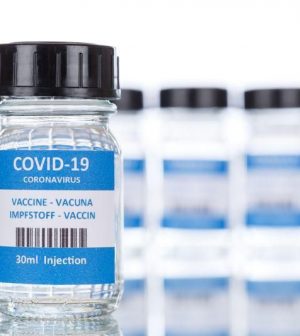- Could Your Grocery Store Meat Be Causing Recurring UTIs?
- Are You Making This Expensive Thermostat Error This Winter?
- Recognizing the Signs of Hypothyroidism
- 10 Strategies to Overcome Insomnia
- Could Artificial Sweeteners Be Aging the Brain Faster?
- Techniques for Soothing Your Nervous System
- Does the Water in Your House Smell Funny? Here’s Why
- Can a Daily Dose of Apple Cider Vinegar Actually Aid Weight Loss?
- 6 Health Beverages That Can Actually Spike Your Blood Sugar
- Treatment Options for Social Anxiety Disorder
COVID Vaccine Boosters Crucial for Some Cancer Patients: Study

Cancer patients with immune systems weakened by treatment are among the groups most concerned about the continued spread of COVID-19 and the chance of the infection becoming severe.
New research suggests more guidance on how often these patients need protective booster shots.
It’s not one-size-fits-all, but depends on the specific treatment, said scientists from Yale University and the University of North Carolina at Charlotte.
The results may also help other non-cancer patients faced with other diseases. “Fears of severe COVID-19 are not restricted to cancer patients,” said the study’s co-leader Alex Dornburg, an assistant professor at UNC Charlotte. “We hope to develop similar analyses that provide guidance to protect other patients who are especially vulnerable.”
While the U.S. Centers for Disease Control and Prevention recommends that immunocompromised patients receive COVID-19 booster shots “as needed,” this study looked at what that means specifically for cancer patients.
Increased boosting in cancer patients provides benefits similar to those obtained by people without cancer, researchers found.
About 1 in 3 people who don’t get boosters will be infected within two years, the study predicts. For those who get a booster every six months, the risk is 1 in 20.
“It turns out that most cancer patients are protected nearly as well as the non-cancer population by COVID-19 boosting,” said Yale School of Public Health Professor Jeffrey Townsend, the study’s lead author, in a Yale news release. “But there is a big exception.”
“Some cancer therapies directly attack immune cells,” Dornburg explained in the release. “This is great for battling blood cancers such as some lymphomas, but the death of immune cells also opens a window not only for COVID-19 infection, but for severe infection.”
Cancer patients whose treatment directly impacts immune response would benefit from much more frequent boosters. If they received a booster every year, 1 out of 3 patients on these therapies would still be vulnerable to getting COVID within two years unless they had other interventions.
If they were to increase that to getting a booster every three months, their risk would halve.
“These results are based on a typical patient with a typical immune response receiving common therapies,” Townsend said. “It remains the case that every patient may have mitigating factors that doctors must consider when advising whether and when an additional COVID-19 booster schedule may be appropriate.”
Researchers used data from several COVID-19 studies already published as well as studies of other coronaviruses.
The study was published Aug. 21 in the Journal of the National Cancer Institute.
More information
The U.S. Centers for Disease Control and Prevention has more on COVID-19 vaccines.
SOURCE: Yale University, news release, Aug. 21, 2023
Source: HealthDay
Copyright © 2026 HealthDay. All rights reserved.










